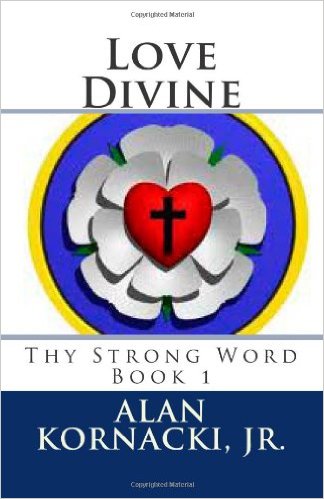My policy as a book reviewer has evolved over the past decade. Whereas at one time I was nearly always open, if not thrilled, when offered a free copy of a book to discuss on my column, I have grown increasingly picky. I have almost reached the point of drawing the line at self-published works. Even that rule, however, wouldn’t have saved me from a recent fiasco in which I printed out a pre-publication PDF of an upcoming book from a seemingly reputable publisher. I won’t name the title, author, or publisher of that book; I wish them all the best. But by page 18 I was so overwhelmed by the novel’s dreadfulness that I binned it and asked my editor to send them my polite regrets. I mention all this so you’ll appreciate the leap of faith it took when I decided to push this self-published novel by my friend, a former colleague in the pastoral ministry, up to the top of my reading list.
It would have been hypocrisy to do otherwise, for two reasons. In the first place, I had been taking writing and self-publishing tips from Alan. In the second place, I had already passed this book along to a friend at my church, who was looking for a nice, chaste romance novel written from a present-day Christian point of view. Narrowing the range of choices even more, she wanted a book that supported her conservative Lutheran faith: a liturgical, sacramental, creedal confession, well to the “catholic” side of most Protestant denominations; yet emphasizing the gift of forgiveness and salvation received only through faith in Jesus, alienating it from the Catholic tradition. The lady’s request was a tall order, but luckily I already had this book and I knew it fit the bill. Once the book came back to me—and my church friend said it was just right—I reckoned it was time to stop making excuses and read it for myself.
Love Divine is the first book of a trilogy titled “Thy Strong Word.” Its sequels are A Great and Mighty Wonder and One Thing’s Needful. These hymn-based titles are your first clue that their warm, human, romantic storyline is adorned and interwoven with a loving portrait of the historic liturgy, hymns, and doctrine practiced, sung, and taught in the biblically faithful, “old-style” Lutheran church. If you feel your nose being pushed out of joint by what I have described so far, you might want to go read something else. If you are curious to read a love story between two flesh-and-blood people, one of whom happens to be a pastor in the church I just described, you can order the paperback or Kindle edition here.
If you’re looking for a steamy novel, draped with soiled bedclothes and discarded lingerie—again, shop elsewhere. Nor is this a scandalizing account of lust and misconduct in the pastoral office. Justin Corwin, 34-year-old pastor at St. Michael Lutheran Church in the western New York town of Carousel, is a decent and upright man who cares for his parishioners, exudes joy and conviction as he preaches, and more or less accepts the likelihood that he will be single and celibate for life. Then at a charity softball game where, as chaplain and shortstop, he represents the fire department, he gets his legs knocked out from under him by an attractive police detective named Beth McCarthy. She is still adjusting to widowhood and starting to think about moving on with her life. From this inauspicious start, the unlikely couple come to find their future in each other.
This book makes a respectable showing, for a first novel by a small-town Illinois pastor. Yes, it’s a work of fiction. And although some Lutheran “insiders” may recognize the names he chose for certain characters, they are fictional too. The romantic leads are appealing characters, but not too rosily perfect. Justin’s social nervousness, his tension-lightening sense of humor, and his average looks make him an every-guy type of leading man, easy for most guys to relate to, while his admirable qualities as a pastor and as a person offer male readers a model to aspire to. Beth’s out-of-his-league beauty belies a searching, hurting vulnerability that makes both Justin and the church he serves the right medicine for her. And though the author does not shrink from sharing details of the doctrine, rite, and hymnody that he so plainly loves—and his opinion about the alternatives—the tone of the book falls on the right side of the line between a love letter to Lutheranism and an apologetic tract.
The romance is romantic; the emotions of the hero couple are deeply felt; the beauty of their setting, unusual though it may be for this type of story, is well described; serious matters such as danger, death, clergy abuse, intra-parish conflict, and infertility find room for gentle but honest discussion; and, amazingly, the pastor and the policewoman fall passionately in love while setting a good moral example for the church youth group. (“Wait for marriage” seems, after all, to be back on the agenda.) Since the author also kindly sent me copies of books 2 and 3 in the series, I will not have to wait long to find out how things work out for the young pastor and his new wife. And this time, I think, the books won’t have to wait so long for me.



